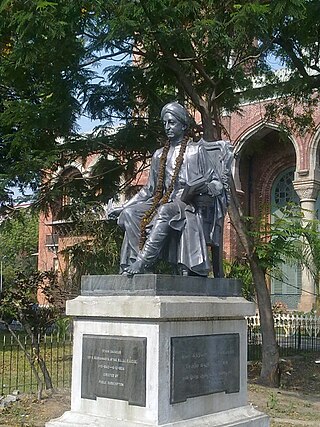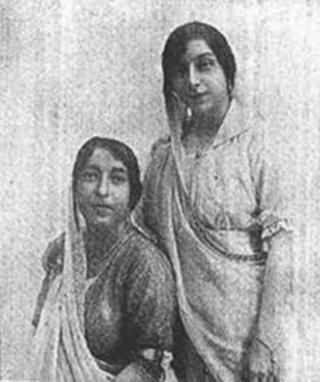Related Research Articles

Sarojini Naidu was an Indian political activist and poet who served as the first Governor of United Provinces, after India's independence. She played an important role in the Indian independence movement against the British Raj. She was the first Indian woman to be president of the Indian National Congress and appointed governor of a state.

Annie Besant was a British socialist, theosophist, freemason, women's rights and Home Rule activist, educationist, and campaigner for Indian nationalism. She was an ardent supporter of both Irish and Indian self-rule. She became the first female president of the Indian National Congress in 1917.

Bhagwan Das was an Indian Theosophist and public figure. For a time he served in the Central Legislative Assembly of British India. He became allied with the Hindustani Culture Society and was active in opposing rioting as a form of protest. As an advocate for national freedom from the British rule, he was often in danger of reprisals from the Colonial government. He was awarded the Bharat Ratna in 1955.
Dhanvanthi, Lady Rama Rau (1893–1987) was founder and president of the Family Planning Association of India and the International Planned Parenthood Federation. She was married to Sir Benegal Rama Rau, the noted civil servant, and was the mother of Santha Rama Rau, the writer.

The Indian Home Rule movement was a movement in British India on the lines of the Irish Home Rule movement and other home rule movements. The movement lasted around two years between 1916–1918 and is believed to have set the stage for the independence movement under the leadership of Annie Besant and Bal Gangadhar Tilak to the educated English speaking upper class Indians. In 1920 All India Home Rule League changed its name to Swarajya Sabha.
The Justice Party, officially the South Indian Liberal Federation, was a political party in the Madras Presidency of British India. It was established on 20 November 1916 in Victoria Public Hall in Madras by Dr C. Natesa Mudaliar and co-founded by T. M. Nair, P. Theagaraya Chetty and Alamelu Mangai Thayarammal as a result of a series of non-Brahmin conferences and meetings in the presidency. Communal division between Brahmins and non-Brahmins began in the presidency during the late-19th and early-20th century, mainly due to caste prejudices and disproportionate Brahminical representation in government jobs. The Justice Party's foundation marked the culmination of several efforts to establish an organisation to represent the non-Brahmins in Madras and is seen as the start of the Dravidian Movement.

Muthulakshmi Reddy was an Indian medical practitioner, social reformer and Padma Bhushan award recipient.

Curuppumullage Jinarajadasa was a Ceylonese author, occultist, freemason and theosophist. The fourth president of the Theosophical Society, Jinarajadasa was one of the world's foremost Theosophical authors, having published more than 50 books and more than 1600 articles in periodicals during his life. His interests and writings included religion, philosophy, literature, art, science and occult chemistry. He was also a rare linguist, who had the ability to work in many European languages.
Besant Theosophical College, established in 1917, it is one of the oldest colleges in the Rayalaseema region of Andhra Pradesh, India.

Sir Subbier Subramania Iyer was an Indian lawyer, jurist and freedom fighter who, along with Annie Besant, founded the Home Rule Movement. He was popularly known as the "Grand Old Man of South India".

Eardley John Norton was a Madras barrister, coroner and politician of British origin. He was also one of the earliest members of the Indian National Congress and a champion of civil liberties and rights of the Indian people.
Sarojini Varadappan was an Indian social worker from the state of Tamil Nadu. She was the daughter of former Chief Minister of Madras, M. Bhaktavatsalam.

Sister R. S. Subbalakshmi, was a social reformer and educationist in India.

Margaret Elizabeth Cousins was an Irish-Indian educationist, suffragist and Theosophist, who established All India Women's Conference (AIWC) in 1927. She was the wife of poet and literary critic James Cousins, with whom she moved to India in 1915. She is credited with preserving the tune of the Indian National Anthem Jana Gana Mana based on the notes provided by Tagore himself in February 1919, during Rabindranath Tagore's visit to the Madanapalle College. She was a member of the Flag Presentation Committee which presented the National Flag to the Constituent Assembly on 14 August 1947.
Ambujammal Desikachari née Srinivasa Iyengar (1899-1983) was an Indian independence activist and women's rights activist. A Gandhian, she participated in the Civil Disobedience Movement and served as vice-president of the Tamil Nadu Congress Committee. Ambujammal was awarded the Padma Shri in 1964.

The All-Asian Women's Conference (AAWC) was a women's conference convened in Lahore in January 1931. It was the first pan-Asian women's conference of its kind. Dominated by Indian organizers, "the AAWC was a vehicle for Indian women to voice their ideas and vision of an Indian-centred Asia". Its predecessor, the All Indian Women's Conference (AIWC), aimed to examine areas of education and legislation to improve the position of women. Like the AIWC, the AAWC aimed to expand this agenda in order to include women in Asia's vision for independence.
Stri Dharma was the magazine of the Women's Indian Association which was first published in January 1918 by two Theosophist feminists –Margaret Cousins and Dorothy Jinarajadasa– and continued until August 1936. Its title was Sanskrit for the dharma of women: their right way.

Herabai Tata (1879–1941) was an Indian women's rights activist and suffragist. Married in 1895, Tata's husband was progressive and supported the education of his wife and daughter, hiring tutors to help her with her schooling. In 1909, Tata, who was Parsi, developed an interest in Theosophy and within a few years made the acquaintance of Annie Besant. Around the same time, in 1911, she met Sophia Duleep Singh, a British suffragist with Indian heritage, who influenced her development as a suffragist. A founding member and the general secretary of the Women's Indian Association, she became one of the women who petitioned for enfranchisement before the Montagu-Chelmsford investigation in 1917.
The Women's suffrage movement in India fought for Indian women's right to political enfranchisement in Colonial India under British rule. Beyond suffrage, the movement was fighting for women's right to stand for and hold office during the colonial era. In 1918, when Britain granted limited suffrage to women property holders, the law did not apply to British citizens in other parts of the Empire. Despite petitions presented by women and men to the British commissions sent to evaluate Indian voting regulations, women's demands were ignored in the Montagu–Chelmsford Reforms. In 1919, impassioned pleas and reports indicating support for women to have the vote were presented by suffragists to the India Office and before the Joint Select Committee of the House of Lords and Commons, who were meeting to finalize the electoral regulation reforms of the Southborough Franchise Committee. Though they were not granted voting rights, nor the right to stand in elections, the Government of India Act 1919 allowed Provincial Councils to determine if women could vote, provided they met stringent property, income, or educational levels.
Dorothy Jinarajadasa was an English feminist, suffragette, and writer based in India. Along with Margaret Cousins and Annie Besant, she established the Women's Indian Association in 1917, and was active in efforts to end child marriage and female illiteracy in India. She was a justice of the peace for Madras, and an active Theosophist. She is one of the earliest members of the suffragist movement in India, and is known for her efforts to build transnational networks between suffrage movements.
References
- ↑ Sudarkodi, S. (1997). "The Women's Indian Association and the Emancipation of Women in the Madras Presidency". Proceedings of the Indian History Congress. 58: 742–743. JSTOR 44144004.
- ↑ Reddi, S. Muthulakshmi (2015-08-14) [August 15, 1947]. "Emancipation of Women". The Hindu. ISSN 0971-751X . Retrieved 2019-07-10.
- ↑ K, Broome, Sarah (2012). Stri-Dharma: Voice of the Indian Women's Rights Movement 1928-1936 (Thesis). Georgia State University.
{{cite thesis}}: CS1 maint: multiple names: authors list (link)